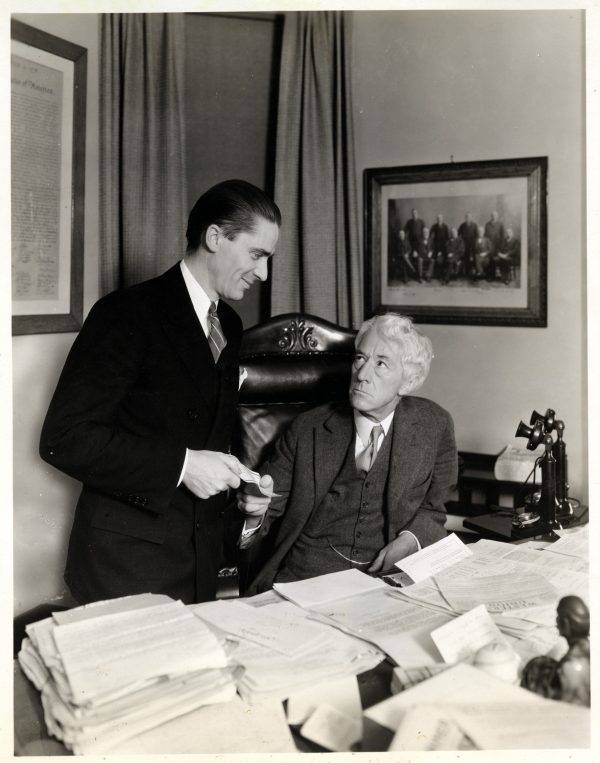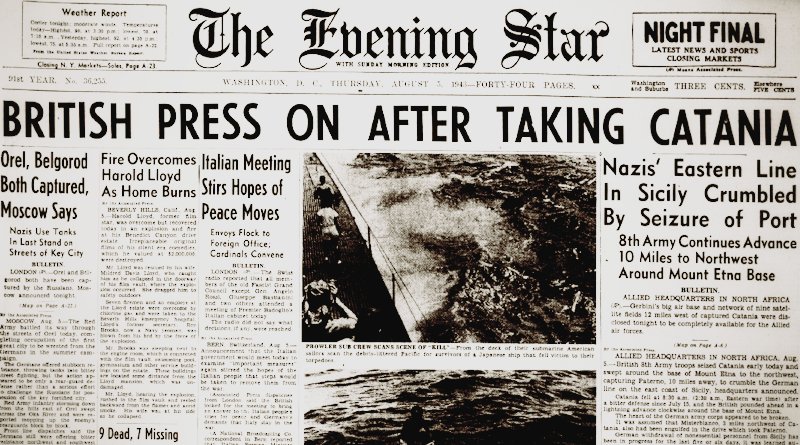World War II Chronicle: August 5, 1943
Click here for TODAY’S NEWSPAPER
Page three reports that Senator Edwin Johnson (Democrat, Colo.) called for the Japanese Empire to be handed over to the Chinese and that Japanese people should be sent to Siberia… On page four, 1941 National League Most Valuable Player Dolph Camilli says he is done with baseball after the Dodgers dealt him to the New York Giants… Speaking of baseball, Commissioner Kenesaw Mountain Landis’ son has been named the chief of I Troop Carrier Command. Reed G. Landis enlisted in the Illinois Cavalry and served on the Mexican border before becoming a pilot for the U.S. Army Signal Corps. He was assigned to fly with the Royal Air Force and shot down 12 enemy aircraft before being named commander of the (U.S. Army’s) 25th Aero Squadron. Reed earned a Distinguished Service Cross and a Distinguished Flying Cross…

George Fielding Eliot says that the government would be wise to throw cold water on the wishful thinking that the end of the war is around the corner (see page 12)… Sports on page 20, which reports that the Army says college football programs for its trainees is not going to happen. Men training to be pilots or officers generally have about six hours of free time a week and their focus needs to be on winning the war, not football games.
Roving Reporter by Ernie Pyle
SOMEWHERE IN SICILY — Fewer than a third of the sailors on our ship were regular Navy. And most of that third hadn’t been in the Navy many years. Most of our crew were young peacetime landlubbers who became sailors only because of the war and who were longing to get back to civil life.
These “amateurs” make a crew somewhat less efficient than you would have found before the war. They just haven’t had time to become thoroughly adept. But their officers say they are all terribly willing.
Here are a few little sketches of some of the men who made the wheels go ’round on the ship I was on.
Joe Raymer. He’s an electrician’s mate first class. His home is at Columbus, O. He is married, and has a daughter 4 years old. Joe was in the Navy from 1924 to ’28, so he knows his way around ships.
He is medium height, pleasant fellow with a little silver in his hair and a cigar in his mouth. I don’t know why, but sailors smoking cigars have always seemed incongruous to me.
Before the war Joe was a traveling salesman, and that’s what he intends to go back to. He worked for the Pillsbury flour people — he had central southern Ohio. He was a hot-shot and no fooling. The year before he came back to the Navy he sold more pancake flour than anybody else in America, and won himself a $500 bonus.
Warren Ream. His home is at Paradise, Calf., and he has worked for several years in the advertising departments of big Los Angeles stores — Bullocks, Barker Bros., Robinsons. He arrived over here just in time to get aboard ship for the invasion. Actually he thinks he wasn’t supposed to be aboard ship at all, but he was glad he didn’t miss it.
Ream is a storekeeper third class, but that doesn’t necessarily mean he keeps store. In fact he does a little bit of everything from sweeping up to passing shells.
His life is a great contrast with what it used to be. Reams is the kind of fellow you would think would be tortured by the rough life of the Navy. But we were standing at the rail one day and he said:
“I wonder what’s happened to the old Navy we used to read about. I remember hearing of skippers who would cuss for 45 minutes without repeating themselves. But from what I’ve seen, skippers today can’t cuss any better than I can. I’m disappointed.”
Harvey Heredeen. He is now a warrant officer, which means he eats in the wardroom and is called Mister. But a man’s a man by any other name, and Mr. Heredeen looks exactly like what he has always been — a regular old-time naval chief petty officer. He got orders to return to the States just before we sailed, but you wouldn’t get an old-timer to miss a show like this. He got permission to postpone the homeward trip until after we had made the invasion.
Mr. Heredeen retired from the Navy in 1935 after 17 years of it, twelve of them in submarines. He had met a Memphis schoolteacher so he got married and settled down in a job at the Linds Air Products Co., making oxygen. He came back two and a half years ago. He is 45 now.
Before long he will be back in America instructing at submarine school. his nickname is “Spike,” and his home is in Memphis. Back home he was a deacon in the London Avenue Christian Church. He says not to make any wisecracks about his cussing and tobacco-chewing when I write him up. Okay, Deacon.
Evening star. (Washington, D.C.), 5 August 1943. Chronicling America: Historic American Newspapers. Lib. of Congress.
https://chroniclingamerica.loc.gov/lccn/sn83045462/1943-08-05/ed-1/
